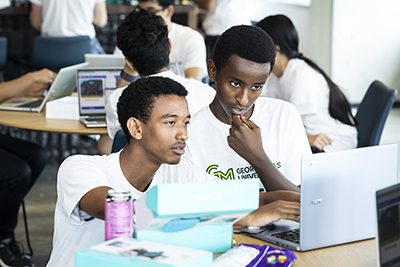Reimagining Education Through Innovation: ACCESS Academy and the Future of Learning
September 25, 2025
By Christy Hudson

ACCESS Academy Students
In the evolving landscape of public education, where access and opportunity, relevance, and technological fluency are foundational rather than optional, George Mason University’s College of Education and Human Development (CEHD) has become a subtle but deliberate force for systemic transformation. This fall, CEHD marked a significant milestone with the launch of the Accelerated College and Employability Skills (ACCESS) Academy, welcoming its first class of students into a high school experience intentionally designed to seamlessly integrate secondary education, college, and career preparation. Through ACCESS Academy, CEHD is advancing an educational model that is innovative not merely in form but in purpose, reconfiguring public education through a systems-level approach to instructional design.
This philosophy is embedded in ACCESS Academy’s four-year course pathway. Ninth-graders begin with a study skills seminar designed to scaffold academic success alongside core courses in English, math, science, and social studies. By eleventh grade, students are completing dual-enrollment coursework in college composition, precalculus, and physics, alongside technology training in data science and database management. Specialized information technology and cybersecurity content runs throughout the program, giving students optional stackable industry credentials. The sequence culminates in a two-part Senior Design Capstone, where students combine technical skills, critical thinking, and creativity within the discipline to address authentic, open-ended problems in partnership with faculty and industry mentors. This design ensures that students do not simply accumulate credits but rather engage in experiential learning as an integrated continuum from high school to higher education and/or the workforce.
“ACCESS Academy represents a new way of thinking about learning," explained Ingrid Guerra-López, Dean of CEHD. “We are designing for evolving needs, not what’s always been done—aligning learning design with the lived realities of students, the expectations of higher education, and the changing demands of the workforce. Innovation, in this sense, is not about chasing what’s new, but about purposeful design. It’s about creating structures that adapt, endure, and serve learners and society.”
This vision of purposeful design extends into George Mason University’s Grand Challenge Initiative, a comprehensive research framework that calls for multidisciplinary responses to complex societal issues. One such challenge—how to ethically and effectively integrate digital technologies, including artificial intelligence, into education—was addressed this summer through the ACCESS Academy's Artificial Intelligence Summer Camps, held at Fuse at Mason Square, the university’s innovation hub in Arlington. The camps brought together more than 130 high school students from across the region over three week-long cohorts in robotics, coding, and ethical inquiry. Students worked with Micro:bit technology to build and program robots, culminating in collaborative exercises led by industry partner Kovexa, who challenged students to enhance their designs and reflect on the ethical and societal implications of how they applied AI.
The camps’ pedagogical approach went beyond technical tools, introducing students to the human questions surrounding AI. During a visit to the Mason Autonomy and Robotics Center, George Mason graduate students demonstrated real-world applications of robotics and sensors, fostering “future visioning”—a teaching strategy that links present learning to long-term goals.
This emphasis on connecting ideas and applications reflected the camps’ core instructional model: problem-based learning. At the heart of the model are complex problems that require students to think critically, integrate knowledge and skills within the discipline, and consider a range of possible solutions. In practice, campers experimented with robotic designs that could be approached in many ways and role-played as entrepreneurs or policymakers to analyze AI from different perspectives.
To understand how these strategies played out in real time, CEHD’s evaluation team observed camp activities, interviewed facilitators, and surveyed students. Their findings underscored several core principles: experiential learning as foundational to technology education; collaborative structures that promote peer teaching and teamwork; real-world connections that inspire career exploration; instructional freedom that allows for creativity and discovery; and individual accountability within group learning environments. Nearly three-quarters of students said they would recommend the experience to peers, and 60% expressed interest in AI, robotics, or IT careers—evidence that these approaches are both engaging and highly useful. Facilitators highlighted the importance of resilience, creativity, and problem-solving, noting that students engaged with college-level concepts in ways that felt both accessible and meaningful.
“Problem-based learning is central to the ACCESS Academy design because it mirrors the complexity of the real world,” said Dr. Kimberley Daly, ACCESS Academy Project Manager. “By engaging students with ill-structured problems, we are teaching them to navigate ambiguity, apply their knowledge and skills within the discipline, and think like practitioners. This approach builds technical competence and the habits of mind—adaptability, persistence, and ethical reasoning—that will sustain them in higher education and throughout their careers.”
In an era when “innovation” is often equated with novelty, ACCESS Academy demonstrates that meaningful transformation requires depth, coherence, and intentional design. Through CEHD’s leadership, ACCESS Academy is not only preparing students for college and careers—it is equipping them to become the resilient, adaptive, and ethical practitioners that Virginia’s future demands.
“Intentional collaboration across educational sectors can yield scalable innovations that respond to both local needs and statewide priorities," said Dr. Roberto Pamas, Director of ACCESS Academy. "Virginia Governor Youngkin's upcoming visit to Fuse at Mason Square underscores the significance of the work of ACCESS Academy—not just as a promising local initiative, but as part of a broader effort to reimagine public education in Virginia.”
ACCESS Academy exemplifies how intentional design, collaboration, and research-informed practice can redefine public education for the 21st century. Through its innovative instructional model, experiential learning opportunities like the AI Summer Camps, and alignment with broader societal challenges, ACCESS Academy positions CEHD as a catalyst for systemic change—demonstrating that universities can lead in reimagining public education with both coherence and broader opportunity at the core. As ACCESS Academy grows, it offers a replicable blueprint for transforming learning, proving that meaningful innovation is not about novelty but about designing systems that endure, evolve, and serve.
